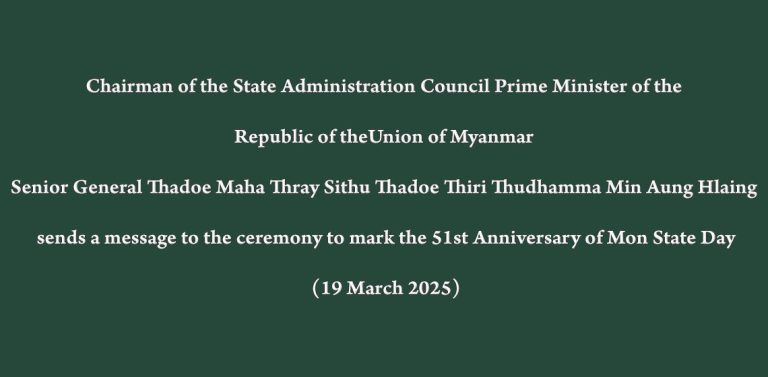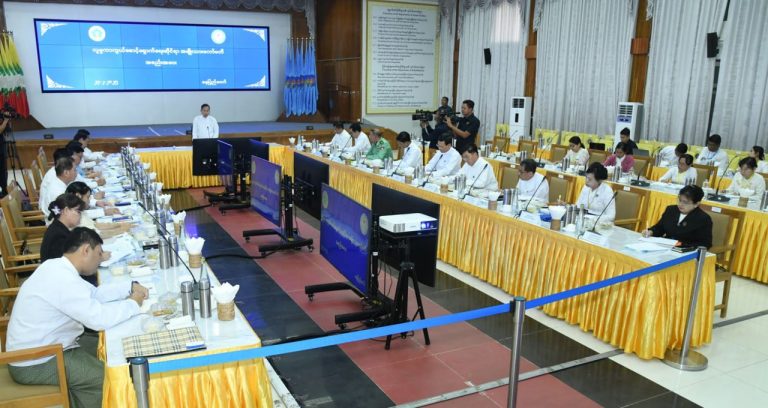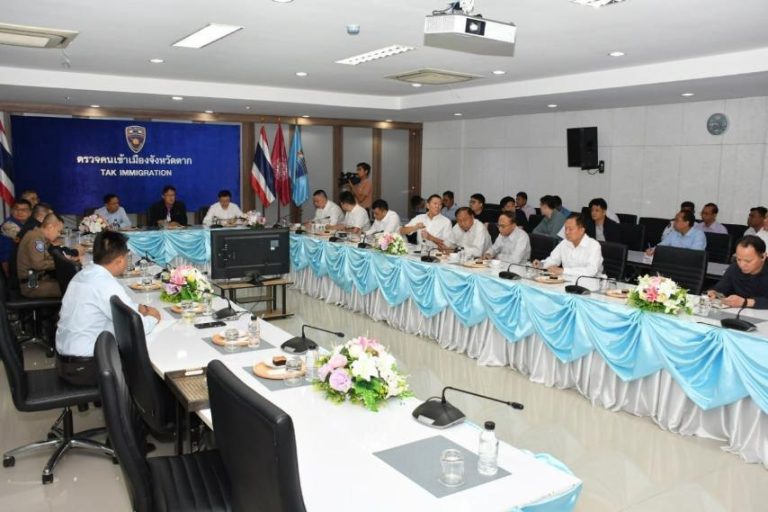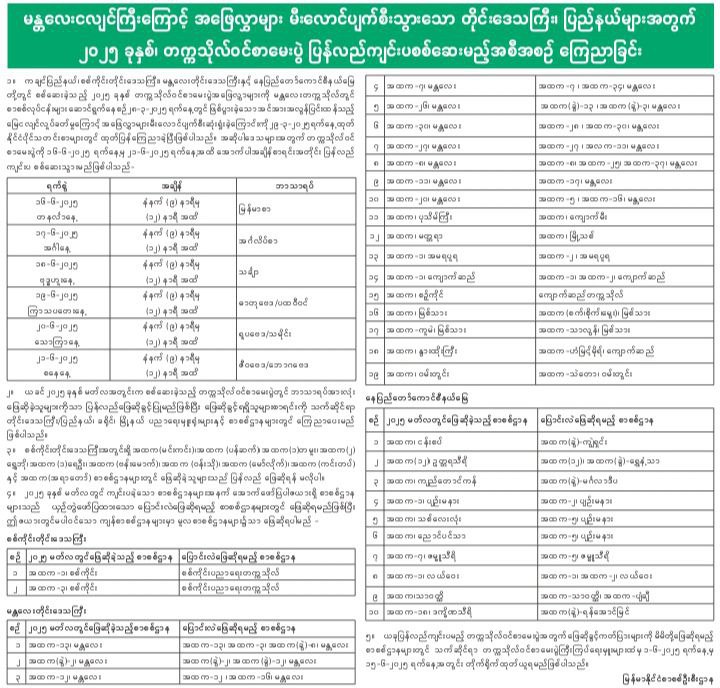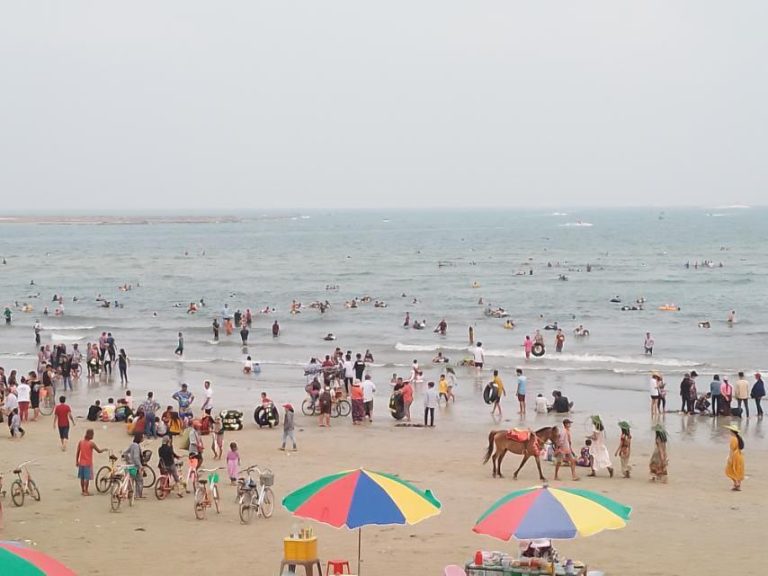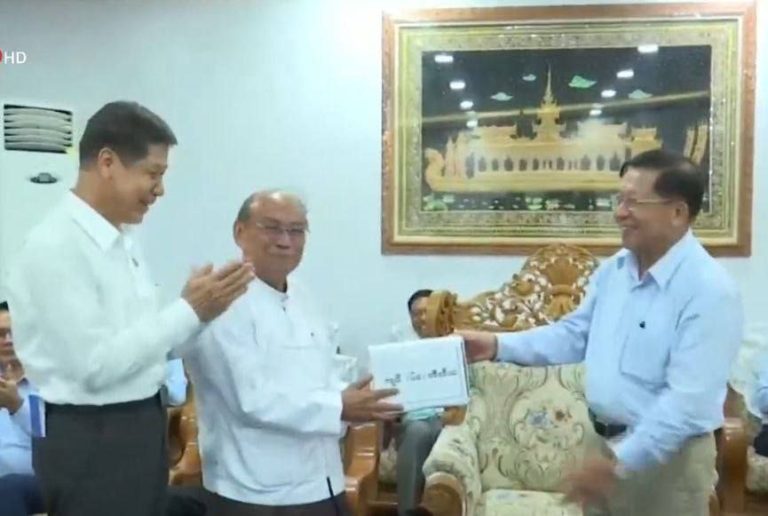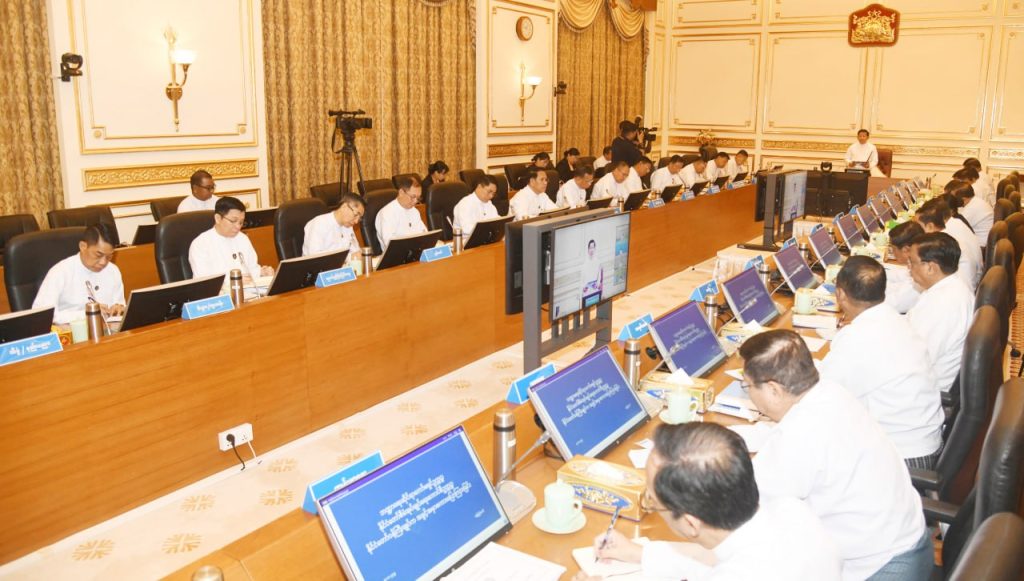
28 November 2024
The Financial Commission held a meeting at the State Administration Council Chairman’s Office here this morning,addressed by Chairman of the commission Chairman of State Administration Council Prime Minister Senior General Min Aung Hlaing.
Also present were Vice Chairman of the Commission Vice Chairman of State Administration Council Deputy Prime Minister Vice-Senior General Soe Win, Secretary of the commission Union Minister for Planning and Finance U Win Shein, union ministers, the union auditor- general, deputy ministers and the Nay Pyi Taw Council chair. Region/state chief ministers attended the meeting through video conferencing.
In his keynote address, the Senior General said at this meeting the Financial Commission will have to approve the supplemental budget requests of the Union and regions and states for fiscal year 2024-2025. After the completion of the approval process, the submission of supplemental budget appropriation bill for FY 2024-2025 of the Union to the SAC for approval through the government will follow.
Supplemental funds are requested for the additional funds when originally approved funds are not adequate for expense of essential projects and programs for the relevant FY, and inadequacy of the originally approved funds for fund transfer and failure to transfer the surplus amount of general funds occur.
As the supplemental funds requested by departments and organizations can be used only after the SAC has approved them through an additional fund appropriation bill, there is only a four-month spending time left. Hence, only the expenses for the projects that can be completed before the end of the FY should be asked.
Increase in spendings will earn benefits such as boost in production, support for local consumption, generation of job opportunities, trade development.
In addition, it will bring about a strong government leadership and an economic situation for ensuring regrowth in the national economy through the increase in the buying power of the private sector.
In order to remedy the economic impact of certain cases, farming-based production industries, the main output of the country, must meet their target.
Only then will the national economy recover through the development of related production industries and services.
The country can reduce imports and foreign currency spendings only through the development of local production industries.
This will also lead to facilitating domestic currency flow and supporting financial stability.
Union ministries, region/state governments should effectively use the State-approved supplemental funds for the works that can provide swift support for national economic growth and improve socioeconomic life of the people.
Guidance has been given for the national GDP growth through efforts in multiple sectors.
Union ministries and region/state governments should strive to meet the GDP targets that are related to spendings.
The Vice Chairman of the Commission said the supplemental funds requested by union level departments and organizations for FY 2024-2025 are submitted to the Financial Commission in accord with the Constitution.
In verifying the supplemental fund request, additional allowance for helping ease the basic needs of civil servants that began in August 2024, which is not included in the normal expenditure and originally approved funds, and financial support and revenue sharing by the Union were also approved.
As the National Disaster Management Fund must be provided for rehabilitation for unexpected natural disasters and preventive measures agsinst other disasters, and basic needs and management measures for displaced people, the cash assistance account from the additional budget of the Ministry of Planning and Finance was added with Ks-275 billion. So, the additional budget bill was submitted to seek the approval of the Finance Commission.
Secretary of the Commission Union Minister U Win Shein reported on the additional accounts of the Union, the prepared estimated accounts and the additional budget of the Union for 2024-2025 financial year.
Union Minister for Legal Affairs and Union Attorney-General Dr Thi Da Oo and Union Auditor-General Dr Khin Naing Oo discussed measures related to the bill, and measures to be taken in the future for the findings on the budgets.
The Nay Pyi Taw Council Chairman and chief ministers of regions and states reported on their sectors.
Increase of the State DGP
In his response to the reports, the Senior General said that if the State GDP increase, the country can spend more amount of the budget to develop the nation.
GDP of Myanmar is lesser than neighbouring countries and regional countries, and Union organizations and regions and states have to strive for increase of the GDP.
It is necessary to increase manufacture to rise the State GDP. In this regard, if agricultural produce rise in the agriculture sector, the agri-based industrial sector will improve. If so, manufacturing will boom as well as service sector will develop. Consequently, the amount of currency circulation will increase where the financial sector will bolster. As all sectors will interconnect, efforts must be mde to develop the agriculture and livestrock sectors.
As prices of basic foodstuffs depend on natural disasters and hiking the prices of inputs, people from the basic strats are facing difficulties. Majority of the primary consumed chicken, pig, goat and fish can be bred in relevant regions successfully.
If people do these businesses really, it can contribute to food security in relevant regions, and people can buy them at fair prices. If these animals are bred in farms systematically, they will have improvement. If these animals are fed with the use of raw materials of relevant regions, successful livestock breeding farms can be implemented. It is necessary to emphasize welfare of people from the basic strata.
Likewise, agricultural tasks can be done with the efforts to meet the target cultivation, rise double crop cultivation capacity and expand sown acreage in order to boost per-acre yield of crops. The first two points must depend on existing basic structures.
As it has high potential, emphasis must be placed on implementing the plans. Relevant ministries and regional and state officials need to consider how to provide full inputs to the agricultural tasks. As agricultural water plays a key role in agricultural tasks and raising double cropping, it is necessary to utilize rain-fed, irrigation water, river and creek water, and underground water for agricultural tasks. If agriculture and livestock tasks can improve, GDP will rise with the increase of State finance. If products are quality, these can be exported to rise export volume.
In connection with the growth of GDP, incomes can be generated if high-quality products can be manufactured from bamboo, a forest product. To facilitate transportation for the public, it is necessary to take upgrading airports and repairing railroads damaged by natural disasters into consideration.
Similarly, it is necessary to take enabling sons and daughters of defence services personnel, members of the police and retired public staff, who lost their lives while performing their stability and law enforcement duties, to pursue their education and vocational education into account. As for universities, necessary infrastructures for students must be provided in universities in states and regions.
Tree of abundance cannot grow from ground spontaneously, basic public needs will be fulfilled
Rehabilitating measures must be taken for damage caused by natural and man- made disasters.
As necessary budgets will be allocated, the tasks must be carried out by assessing the needs. As budgets can be allocated when revenues are available, taxes must be fully collected.
As taxes can be collected only when there are manufacturing industries, systematic measures must be taken for the success of businesses that are based on agriculture and livestock breeding in regions and states.
The government will provide investments and other needs for agriculture and livestock breeding and manufacturing industries based on them. Concerted efforts must be made by respective ministries, regions and states. Priority will be given to providing basic needs of the people in states and regions including the Nay Pyi Taw Council Area in the current and future fiscal years.
As the tree of abundance cannot grow from the ground spontaneously and efforts must be exerted to foster the tree of abundance, it is necessary to make concerted efforts for the economic development of the country seriously.
Then, the Senior General made concluding remarks, saying fulfillment of food, water and basic needs, creation of job opportunities and socioeconomic development of the people must be implemented in the endeavour for economic resurgence of the country as the agriculture and livestock breeding sector is the foundation for the economy in accordance with the economic objectives of the SAC. Therefore, concerted efforts must be made for manufacturing industries based on agriculture and livestock breeding while boosting exports and shifting the focus from normal operations of the economy to economic development.
Each government employee was allowed to enjoy Ks-30,000 monthly financial support and furthermore, they have been allowed to enjoy another package of Ks- 30,000 monthly financial support since 1 August, 2024. Moreover, retired government employees who performed duties of the country have been allowed to enjoy Ks- 30,000 monthly financial support since 1 August, 2024. The government allocated additional spending necessary for the monthly financial support.
Electricity is essential for socioeconomic development of the country and electricity generation costs have increased fiscal year by year to supply electricity to the public on a regular basis. Therefore, the government increased electricity rates and allocated increased spending for electricity generation.
In conclusion, the Senior General urged ministries and region/state governments to coordinate and cooperate among themselves in implementing tasks by spending additional budgets for the 2024-2025 fiscal year, to spend the budgets in accordance with financial rules and regulations and directives, to exert efforts to meet and surpass targeted revenues, to complete tasks to be carried out in the relevant fiscal year in accordance with work qualities and standards and to supervise tasks to prevent wastage and losses of government funds and the meeting concluded.

